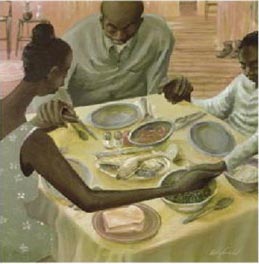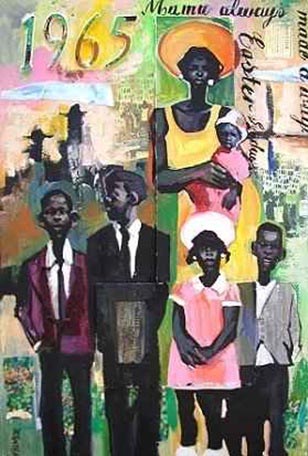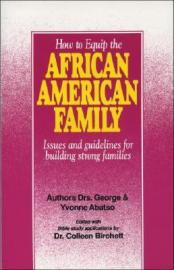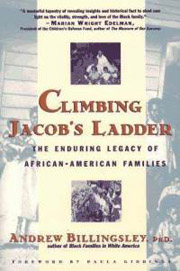Cultural Resources

FAMILY ENRICHMEN/KINSHIP SUNDAY
CULTURAL RESOURCES
Sunday, October 23, 2011
Freeman L. Palmer, Guest Cultural Resources Commentator
Interim Southeast Regional Conference Minister, New York Conference, United Church of Christ, Dewitt, NY
I. Introduction
Our families did and always will play key roles in our physical, emotional, and spiritual lives. African American culture has emphasized the importance of family both in the physical and in the spiritual sense. We have families to whom we belong by birth and families such as our church family to which we are related via the Holy Spirit. Family Enrichment/Kinship Sunday is a time to emphasize the role that faith has in the historical, present, and future well-being of our families and our community in its entirety.
What Is Discipline?
Few would disagree concerning the importance of discipline in the stability and enrichment of our families. Yet I suspect that there would be less agreement on the meaning of discipline and what kind(s) of discipline are best. The popular meaning of the word discipline is punishment or chastisement for the sake of correction. It is related to the word disciple, which comes from the Latin words discipulus and discepere,meaning pupil and to grasp or analyze thoroughly.1 Although one definition of the word certainly relates to correction by whatever means necessary, the concept of discipline incorporates far more. It refers to an “activity or regiment that develops or improves a skill; training” or in an ecclesiastical setting, discipline refers to a “system of government regulating the practice of a church as distinguished from its doctrine.”2 The root of the word used in today’s Scripture comes from the Greek word pa?de?a, which means not only the “whole training and education of children” but also “training and care of the body, instruction which aims at increasing virtue, and those things in adults that also cultivates the soul.”3
Hebrews 12:9-11 has important implications when considering the enrichment of our families. Discipline is not only vital for our children, it is also vital for parents. It is a need of all generations. Even as we are training our children, it is important that we in turn are under the continual instruction of God. The more one engages in practicing a regimen based on the teachings of God, the greater the fruit of righteousness and holiness.
One of the tenets in my denomination, the United Church of Christ, is based on the commission by Pastor John Robinson in 1620 when he commissioned the Pilgrims for their voyage to the New World, saying that “God has yet more light and truth to break from God’s Holy word.” From the commission my denomination proclaims that “God is still speaking.” Indeed God is still speaking, God is still training, and God is still disciplining so that our families may grow in understanding what it means to be holy, belonging to God and God’s reign of love, peace, and justice in the 21st century.
II. A Discipline That Brought Us Through
 |
| “Grace” by John Holyfield |
Howard Thurman (1901–1981) was one of the most prolific African American theologians of the twentieth century and one of my personal theological heroes. Among his works is the book Disciplines of the Spirit, where he speaks of the spiritual practice and discipline of commitment, growing in wisdom and stature, suffering, and reconciliation. But perhaps none are as historically or presently important to family enrichment as the discipline of prayer. The following reflection from Thurman was part of a Lenten series featuring a variety of his writings.
For African American families, the saying that the “family that prays together stays together” holds statistically true according to a study posted this year in the Huffington Post. The survey, based on responses to the 2006 National Survey of Religion and Family Life, found that a higher percentage (forty) of African American couples attend church than Hispanic and white couples, read Scripture together at home, and engaged in the discipline of prayer. W. Bradford Wilcox, a co-author of this study and the director of the National Marriage Project at the University of Virginia, stated that “without prayer, black couples would be doing significantly worse than white couples.”5
Richard Wright’s classic Native Son depicts the life of Bigger Thomas, an African American man whose hopes for a better life for himself and his family are rendered non-existent by the social, political, and economic forces of institutional racism. Wright poignantly portrays Bigger as a black man in America whose analysis of his oppressive circumstances leads him with little alternative than to turn to crime. Against this backdrop are his family, his sister Vera, and his mother, who is only referred in the novel as Mrs. Thomas. She supports the family by doing laundry. A churchgoing woman, Mrs. Thomas is one who passively accepts her family’s condition, believing that her faith will be rewarded in the afterlife. Although Wright’s depiction of Mrs. Thomas can be interpreted as an indictment on the black church and organized religion, her desperate plea to God for Bigger’s life is a powerful image of her faith and belief in prayer. Perhaps prayer will not change her or Bigger’s situation, but Wright leaves little doubt here that prayer will give her the power to be sustained through it:
“Ahmen ‘n’ Gawd bless yuh, Sister Thomas,” the preacher said. They took their arms from round Bigger, silently, slowly; then turned their faces away, as though their weakness made them ashamed in the presence of powers greater than themselves. “We leaving you with God, Bigger,” his mother said. “Be sure and pray son.” They kissed him.6
A song which speaks to the power of prayer in our families was one I heard only once during my own childhood, but the memory remains with me to this day. At a choir anniversary at St. Stephen’s Baptist Church in Washington, DC (now located in Temple Hills, Maryland), the Male Chorus broke into “Don’t Forget the Family Prayer.” The lyrics were written by Emma L. Jackson, who was both a prolific singer and later composer of gospel music in Chicago. Jackson was credited with introducing Thomas Dorsey’s classic “Precious Lord Take My Hand” at the National Baptist Convention USA in 1940. But “Don’t Forget the Family Prayer,” according to gospel music scholar Horace Clarence Boyer, was Ms. Jackson’s most popular song and became a classic in its own right. The lyrics of the song speak to the importance of prayer in our families in keeping them together physically, emotionally, and/or spiritually. Here we feature a recording of the Brooklyn All Stars singing this song. The lyrics in this version are changed slightly; the original lyrics from Emma Jackson are below.

Don’t Forget the Family Prayer
Chorus
Don’t forget the family prayer
Jesus goin’ to meet you there
When you gather round the altar
Don’t forget the family prayer.
Verse
Prayer will keep your home together
Bring your wand’ring child back home
Prayer will make you love your neighbor
Don’t forget the family prayer.7
III. Black Families and Auction Blocks
According to Lerone Bennett Jr., the first African American family in America was Anthony and Isabella, who were among the original twenty who landed at Jamestown in 1619, one year before arrival of the Pilgrims on the Mayflower. The couple later married, and their son William was, according to Bennett, the “first Negro child in English America.” The first African American families in this country were treated as indentured servants according to Andrew Billingsley, but after 1690 the majority were brought into the country and sold as slaves.8
Although much has been written on the subject, the entirety of all the works do not fully describe the horror and injustice inflicted by slavery on our people. The slave trade adversely impacted the family traditions of our African ancestors. Families who managed to stay together and travel to the United States on slave ships did so only to become separated from one another by the need for profit by plantation owners. This had a dehumanizing effect on our people and residual consequences exist to this day.
Frances Ellen Watkins Harper, born free in Baltimore in 1825, published her first book of poetry at age 20. In “The Slave Auction,” she depicts the impact of the slave trade on families.
 |
| “A Slave Auction in Virginia” Image Courtesy of the University of Virginia |
The Slave Auction
by Frances Ellen Watkins Harper
The sale began—young girls were there,
Defenseless in their wretchedness,
Whose stifled sobs of deep despair
revealed their anguish and distress.
And mothers stood, with streaming eyes,
And saw their dearest children sold;
Unheeded rose their bitter cries,
while tyrants bartered them for gold.
And woman, with her love and truth—
For these in sable forms may dwell—
gazed on the husband of her youth,
with anguish none may paint or tell.
And men, whose sole crime was their hue,
The impress of their Maker’s hand,
and frail and shrinking children too,
were gathered in that mournful band.
Ye who have laid your loved to rest,
And wept above their lifeless clay,
know not the anguish of that breast,
whose loved are rudely torn away.
Ye may not know how desolate
are bosoms rudely forced to part,
and how a dull and heavy weight
will press the life-drops from the heart.9
A musical setting of this poem is included in Linda Twine’s cantata “Changed My Name,” which uses several spirituals and gospel songs to speak to the evils of slavery and the strength of our people through the combination of faith and music. A performance of this song is given in this video:
IV. Faith and Family in My History
 |
The above painting, “Momamadeaway” by artist Charly Carlos Palmer (no relation to my knowledge), captures memories of Easters in the 1960s during my childhood. Every year at Easter my parents and my sister gathered before church for a photographic portrait in our spring finery. We went on Easter and practically every Sunday to St. Stephen’s Baptist Church in Washington, DC (now in Temple Hills, Maryland). Faith played and continues to play an integral role in our family life, its depth, and its richness. My parents, Freeman and Emma Palmer, have served as deacons at St. Stephen’s Baptist Church for 47 and 29 years respectively. My sister, Emma Vanessa Jones, and my brother-in-law, Reverend Aaron Jones, have reared two teens who have in many ways defied the odds for young African American men. They have had their struggles but have not succumbed to substance abuse, crime, or other forces that surround and tempt them to destructive thought or action. My sister and I were reared as “church kids.” My nephews were as well. And while that did not guarantee our well-being, in retrospect it served to enhance it and did not hurt it. I would argue that the same can be said by most children reared in church today. Families are enriched by consistent church attendance, Bible study, prayer, and righteous living.
St. Stephen’s Baptist Church was not only a place of worship for my intermediate family, it served and still serves as an important spiritual family. My parents were among the first in our family to move north from Dundas, Virginia to Washington, DC. In my early childhood years few family members lived in the area. So the church became an extended family for my family, providing other mothers, fathers, sisters, and brothers who served to discipline us in the ways of God. St. Stephen’s was the village that helped rear my sister and me, providing other mothers who disciplined us and had permission to do so in every way that my parents disciplined us. This was important in providing us with values, mores, and behavior that strengthened and enriched our lives as individuals and as members of a family. My parents still carry on that tradition of extended family at St. Stephen’s, having so many ‘children’ that my mother was told in jest on Sunday that she had enough children and could not adopt another. Thankfully, that has not stopped them, and their spiritual life and well-being is still enriched by the extended family of which they have been a part for these many years.
Faith also plays an important role in the physical and spiritual fortification of my extended family (or kin) . Practically all of my aunts, uncles, and cousins were active in church. This has served to sustain us in difficult and sorrowful times, including the deaths of two first cousins in their thirties. We would not have gotten through these tragedies without our faith. Last year my father’s oldest sister, Mrs. Mattie Coleman Weaver, passed away, and we gathered at Little Mount Baptist Church in Blackstone, Virginia, to celebrate her life. Yet I realized there that the service not only celebrated her faith as the family’s matriarch, it also celebrated our family’s history and faith in the midst of our loss. I was honored to participate in the service by reading Scripture. Both my sister and second cousin offered solos, the choir was filled with first and second cousins on both my mother’s and father’s side (this was the church where both sets of grandparents worshipped), and another first cousin offered an eloquent eulogy in memory of my aunt. I greeted two more second cousins who were ministers, and despite differences of distance, time, and life experiences, our time together as a family was enriched by our common bond of faith. This, despite the circumstances, was a firsthand experience of the role the church played in our upbringing and in the quality of my family’s life.
V. Three Enriching Media Images of Church and Family
1. A favorite television show of mine was and always will be the sports drama Friday Night Lights, a show on NBC that was far less about high school football than it was about life in the fictional town of Dillon, Texas. A principal character in the early seasons was Brian “Smash” Williams, the star running back for the Dillon Panthers. He grew up in a single-parent household, and it was the strength of his mother, his coach, and his church who helped Williams end his use of performance-enhancing drugs (steroids), kept his hopes of college football alive despite a devastating injury, and encouraged him to try out as a ‘walk on’ with Texas A&M University, where he eventually achieved his dream of playing college football. This series not only portrayed Williams’s mother Corrina Williams with authenticity and dignity, it was a one of the very few television shows or movies I have seen that portrayed a church congregation with authenticity and dignity as well. At the link below you can see the scene between Corrina and Smash where she discloses the circumstances surrounding his father’s death.
www.hulu.com/watch/1726/friday-night-lights-revisiting-michael.
2. Many know movies produced by Tyler Perry and T.D. Jakes, which feature the black church and its influence in the lives of its characters. Another which would not immediately come to mind is The Apostle, written, directed, and starred in by Robert Duvall. In the film Duvall plays Eulis “Sonny” Dewey, a minister who flees from his past in Texas to become a radio evangelist in Louisiana. The film has excellent depictions of black churches in the South, beginning with a scene from a service showing his attendance at a small country church New Boston, Texas, with his caretaker and her family. One can easily see that this was the place where Dewey gained his “preaching chops” (learned how to preach) and shows an excellent depiction of “tag team preaching,” once popular in tent revivals. Online location:
http://www.youtube.com/watch?v=jPqaz9QfK5I
3. An excellent story appeared recently on the CBS television program Sixty Minutes called “Gospel for Teens,” profiling the Gospel for Teens program run by Vy Higginsen, best known as the author of the musical “Mama, I Want to Sing!” The story described not only how her program was preserving the history and importance of gospel music for the current generation of youth and young adults, but it also demonstrated how singing in a sacred community was also preserving and enriching the lives of the teens who participated. Among the teens in this segment was David Moses, a 14-year-old from Brooklyn, New York. He sang not only with his family at home but in church as well. His mother, Veronica, stated the following concerning parenting: “We have to raise our children. If we don't, someone else will, meaning the streets, drugs, gangs, you name it.” When asked whether it is harder to raise a young black teenager, David’s father Darrell replied, yes, “and one of the reasons why you see me here, not just my wife, but you see me here also, is because I vowed that I would walk this walk with them. They can turn around years from now and say my father was right there.” One can read this story and hear the choir by accessing the link:
www.cbsnews.com/stories/2011/03/31/60minutes/main20049243.shtml?tag=contentMain;contentBody
VI. What of Our Families?
A recent entry in the Huffington Post “Makes me wonder about the future of the black family.” It contained statistics that give us cause for concern of the future of our families and our people:
- A poverty rate of 35% compared to 33% and 11% for Hispanics and whites respectively.
- While African-Americans constitute 13% of U.S. population, 52% of crimes are committed by African Americans.
- 46 % of homicide victims in the United States are African-American.
- The high school dropout rate is 12% for African-Americans compared to 5% for whites.10
The above statistics indeed warrant concern. I sincerely believe that the church can be an important agent in reversing the trends conveyed in these statistics. As long as the church serves as part, to paraphrase the words of the popular African proverb, of the “village that it takes to raise a child,” both individuals and families will be provided with the strength to overcome adversity. But the success of this will depend in no small measure on the extent to which all parents ensure that their children adhere to and practice the spiritual disciplines demonstrated by Jesus Christ. As long as we, in the words of the Proverb, continue to “train children in the right way . . . when old they will not stray” (Proverbs 22:6). By following God’s teaching and discipline, our families and our people continue our history as a people of spiritual resiliency and strength despite our challenges.
VII. Suggestions for Further Reading/Research to Enrich Black Families
 |
Abatso, George and Yvonne. How to Equip the African American Family: Issues and Guidelines for Building Families. Chicago, IL: Urban Ministries Press, 1991. |
 |
Billingsley, Andrew. Climbing Jacob’s Ladder: The Enduring Legacy of African American Families. New York, NY: Touchstone Publishing, 1992. |
 |
Gardere, Jeffrey. Smart Parenting for African Americans. New York, NY: Dafina Press, 1999. |
 |
Halbrowski, Freeman A. and Maton, Kenneth I., et al. Overcoming the Odds: Raising Academically Successful African American Women. New York, NY: Oxford University Press, 2002. |
 |
Johnson, Robert L. and Stanford, Paulette. Strength for the Journey: Five Essential Disciplines African Americans Must Teach Their Children and Teens. New York, NY: Broadway Books, 2002. |
Online Resources
- Go African.com is a site of articles and resources on the African American Family, lifestyle, and culture. Online location: www.goAfrican.com
- Black Mom’s Club is an online resource for African American mothers, single parents, and adopting parents.
VIII. Conclusion
The following words of wisdom from the book In Our Own Words: a Treasury of Quotations from the African-American Community11 are testimony to the importance of discipline and faith in the lives of our families:
- What your mother tells you now, in time you will come to know.
—Gloria Joseph, Educator - Advise and counsel him; if he does not listen, let adversity teach him.
—Ethiopian Proverb - Know who your kids are running with. Because if you don’t know who they’re running with, how are you going to know when they’re running with the wrong people?
—James Parker, Program Manager, Substance Abuse Treatment Facility - Sometimes we get so caught up in looking for the big example, we lose sight of people who, in their daily lives, stand up for what they believe. My parents were just ordinary people, but in their convictions, their efforts, they were people of real conscience.
—Alan C. Page, NFL Hall of Famer and Associate Justice, Minnesota Supreme Court - What these mothers passed on would take you anywhere you want to go.
—Dr. Mary Helen Washington, Professor, University of Maryland College Park - Our children are in so much trouble because we adults are in trouble.
—Camille Yarborough, poet and author of Take Yo Praise - Good behavior reflects good background.
—Ugandan Proverb - When I am feeling paralyzed by a task that seems too difficult, I remember the love that lies in the core of my family and their legacy to me. The love gives me strength and I can go on.
—Jonah Edelman, son of Marian Wright Edelman, founder of the Children’s Defense Fund - Just because you are in hell don’t mean you should act like the devil.
—Katherine Brown (and legions of other mothers) - If your son laughs when you scold him, you ought to cry, for you have lost him; if he cries, you may laugh, for you have a worthy heir.
—Senegalese Proverb
AMEN!
Notes
1. “disciple.” Online Etymology Dictionary. http://dictionary.reference.com/browse/disciple
2. “discipline.” Dictionary.com Unabridged. Random House, Inc.
http://dictionary.reference.com/browse/discipline
3. Blue Letter Bible. “Dictionary and Word Search for chastisement in the KJV.”
http://www.blueletterbible.org/search/translatonResults.cfm?Criteria=chastisement@tKJV
4. Schaper, Donna, ed. Forty Day Journey with Howard Thurman. Minneapolis, MN: Augsburg Books, 2009, p. 60.
5. Banks, Adelle M. “People Who Pray Together Stay Together.” The Huffington Post 3/23/11.
http://www.huffingtonpost.com/tag/people-who-pray-together-stay-together
6. Wright, Richard. Native Son. New York, NY: Harper Collins Publishers, 1940, p. 279.
7. Boyer, Horace Clarence, The Golden Age of Gospel. Chicago, IL: Black Belt Press, 1995, pp. 76–77.
8. Billingsley, Andrew. Climbing Jacobs Ladder: The Enduring Legacy of African American Families. New York, NY: Touchstone Publishing, 1992.
9. Harper, Frances Ellen Watkins. “The Slave Auction.”
http://www.poetryfoundation.org/poem/177157 accessed 6 April 2011
10. “Makes me wonder about the future of the black family.” The Huffington Post.
http://www.huffingtonpost.com/social/constitutional_ 1/racial-generation-gap-census-analysis_n_845276_83375726.html
11. Boyd, Elza Dinwiddie. In Our Own Words: A Treasury of Quotations from the African- American Community. New York, NY: Hearst, 1996, pp. 87–105.



